
16 minute read
Regional round-up
CANEGROWERS REGIONAL ROUND-UP
Supplied by CANEGROWERS district offices
Advertisement
MOSSMAN
Mossman’s weather and crush turned a corner in mid-July, with the district experiencing mainly fine, sunny days, cool nights and minor lost time since then.
At the end of Week 10 (23/8/2020) Mossman Mill had processed a total of 308,007 tonnes of cane for an average of 11.87CCS and an additional 54,061 tonnes of Mossman cane had been toll-crushed at the Tableland Mill.
Coastal growers supplied a total of 227,660 tonnes and Mossman Tableland growers supplied 134,408 tonnes.
CCS continues to be quite low but the coast is starting to see some improvements in weekly averages so it now sits at 11.49, while the Mossman Tableland growers average is 13.30.
The crop estimate has dropped below 700,000 tonnes to 685,000 tonnes of cane. Mill availability has improved since the start of the season and sits well above 80% most weeks. As at 23/8/2020, Mossman Mill is approaching 45% cut.
With the finer weather, growers have been able to get ground ready for planting. Mossman Agricultural Services (MAS) has funding to purchase a number of weather stations for the Mossman basin. The first meeting was held on 18 August and
opened its cane seed plots and allocations have been made
The Hot Water Treatment tank is now up and running.
MAS has used some Department of Agriculture water quality Mossman area. They are hoping to install them on cane farms and allow all growers access to the information through a website or app.
CANEGROWERS Mossman has been invited to be part of developing a Terrain NRM water quality project in the and sent to growers.
involved reps from MAS and the Wet Tropics Sugar Industry Partnership.
This project, once signed off by the Minister, will be funded under Reef Trust funding as the Great Barrier Reef Foundation funding is focused on higher priority catchments.
The three-year project is to be designed to provide real productivity benefits for growers but to also have measurable water quality outcomes for government.
Pictured: preparing the ground on the Fasano farm.
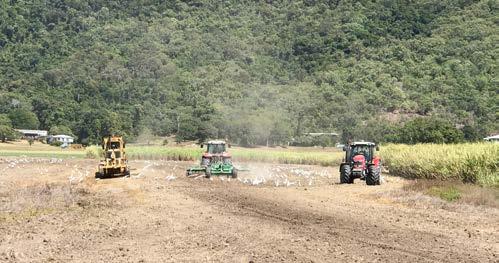
CAIRNS
The weather has remained fine with sunny days and quite cool nights. Taking advantage of the good conditions, growers are busy in the paddocks. Mill performance has been pleasing. The base CCS at both mills will remain unchanged for the present. Please remember, any members intending to use the bean planter are asked to make contact with the office so plans can be made. The mud spreader is also avail for use by members.
INNISFAIL
With the impact of wet weather on the harvest abating, there has been good supply to the mill. As of 18 August, 28% of the pre-season estimate of 1,433,525 tonnes had been crushed.
The South Johnstone Mill performance has continued to be excellent so far this season, maintaining an average crushing rate above 524 tonnes per hour with only minor stoppages The planned daily crush of 12,500 has been achieved on a number of days so far. CCS levels have eased back, mainly due to the wet weather. With the easing of conditions in the paddock, much of the district is in the midst of planting. In a reversal of recent trends, 31.6 hectares of ex-banana land is being returned to sugarcane production. The grower is busy preparing the land to plant this year.
TULLY
The wet weather in June/July continued into August, with the Tully district receiving almost 100mm in the first three days of the month. The rain should boost this year’s crop, which is welcome after the 2019 season achieved one of the lowest tonnes per hectare in some years. Following the early wet weather, conditions fined up for the month and growers have been busy in the paddocks, with ground preparation and planting underway. As a result, there is an increase of farming equipment on the road travelling from one farm to another. Road users must
HERBERT RIVER
The CANEGROWERS Herbert River AGM was held on 24 August. Guest speaker, CANEGROWERS CEO Dan Galligan, spoke about some prominent topics including CANEGROWERS State election focus and strategy, AgForce Cane – what they say vs the reality, Senate inquiry actions and outcomes, and what’s next for CANEGROWERS and its priorities for members. In harvest/crush news: Week 7: Victoria Mill completed a cleaning intermission. Shredder chokes resulted in a stop to inspect and change tips on A Shredder. Macknade Mill also completed a short, planned stop for a shredder Inspection. Victoria Mill crushed 133,177 tonnes for the week and Macknade Mill crushed 72,103 tonnes. The mill average for CCS for the week was 12.27. Week 8: Both Victoria Mill and Macknade Mill undertook a maintenance day and a chemical clean of evaporators. Victoria Mill crushed 146,500 tonnes for the week and Macknade Mill crushed 44,000 tonnes. The Herbert River mills CCS average
BURDEKIN
The 2020 crushing season for the Burdekin remains behind schedule due to a combination of wet weather stoppages and breakdowns. Finish dates are being recalculated and it would be unlikely for mills to report a season finish by the end of November, with a December finish looking probable. There is much talk around a La Nina weather pattern and a wet finish to the season. Growers are hoping for a good run to get as much cane out of the paddock and into the mill as quickly as possible. Father-son growers and contractors Gary and Ashley Stockham (pictured) are pleased to be back in the paddock harvesting cane after a stoppage for wet weather. Further wet weather was predicated after this photo was taken, but thankfully there were no serious downpours. Since February 2020, CANEGROWERS Burdekin (CBL) has initiated several meetings with the other Burdekin grower collectives to gauge the appetite for working more closely together as we feel that the region can achieve more as larger unified group. Representation in the Burdekin has be vigilant, particularly when operating oversized farming equipment. Harvesting operations are going well, with a rise in yield and CCS.
CANEGROWERS Tully representatives and growers travelled to Brisbane recently to speak at the Senate Inquiry into the regulation of farm practices that impact water quality outcomes in the Great Barrier Reef. The Inquiry was well attended, with representatives from multiple cane growing
areas, as well as other entities from across Queensland. for the week was 12.55. The crop in the district is continuing to cut above the estimate.
Week 9: During Week 9, Victoria Mill had a 12 hour stop due to a bump in the 66,000 V Ergon power supply. It was reported that a Brolga hit a power line, resulting in a surge causing the protection system in the mill to trip. It took two hours for Ergon to reconnect power so that the mill could recommence crushing. The fluctuation in power caused several issues to the control gear, variable frequency drives, 5 MW generator exciter and other mill equipment. It took a number of hours to work through the issues and restart factory.
Victoria Mill also had a chemical clean on the evaporators and normal maintenance stop. Victoria Mill has crushed around 125,000 tonnes for the week with an average CCS pf 12.85. Macknade Mill crushed approximately 70,000 tonnes for the
week. been fractured for far too long which only serves to dilute grower messages to the miller, government and community. The level of crossover amongst the collectives is high as we are all representing similar issues on behalf of our members. It makes sense to work more collaboratively Pictured: Ashley and Gary Stockham. where we can, providing that our underlying values and leadership principles are appropriately aligned.
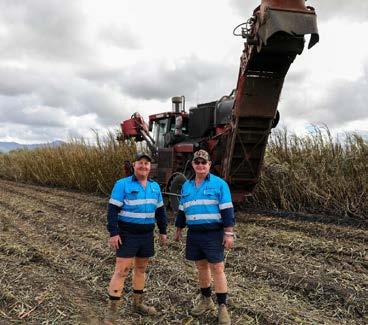
The CBL Board is pleased to announce that we have agreed to establish a closer working relationship with one of the other collectives, Pioneer Cane Growers Organisation Ltd (PCGO), for the purposes of collectively negotiating a CSA with Wilmar, as
CANEGROWERS REGIONAL ROUND-UP
BURDEKIN PROSERPINE
well representing our members on other common issues where appropriate, e.g. rates. CBL and PCGO are committed to working together and will pursue the collective bargaining opportunity as a joint venture and we do not propose to form any new corporate entities for this purpose. This will enable us to capture the synergies of our combined expertise and tonnages for the benefit of our members when negotiating with Wilmar, whilst each retaining our own autonomy to service our respective members as we currently do. Council rates are a topical issue in most growing areas and the Burdekin is no exception. The CBL Board met with two Councilors from the Burdekin Shire Council to discuss rates and diversification. We look forward to working with the Council on addressing these important issues for our members. At the conclusion of Week 8 (22 August), Proserpine Mill had surpassed the half-million tonne mark of the 2020 crush. Throughput over the past few weeks has been reduced due to a combination of wet weather and mechanical issues. Significant time was lost in mid-August due to a broken belt on the conveyor that carries ash from No. 1 and No. 3 boilers.
With fine weather forecast for the next few weeks, it is hoped to recover the lost time.
CCS continues to steadily rise and the season-to-date average now sits at 13.12.
Highest CCS for the month was a rake of first ratoon Q240 from the Lethebrook productivity district which tested 16.25. At this stage, the other stand-out varieties in terms of CCS are Q183 and Q208.
SSP has been busy this past month with planting one-eye setts. SRA has advised the Tissue Culture seedings have been delayed and will now be delivered in late September.
MACKAY/PLANE CREEK
Marian Mill led the three Mackay Sugar mills with 92,304 tonnes of cane crushed for the week ended 16 August (Week 10), followed by Farleigh with 62,902 tonnes and Racecourse with 53,168. The year to date total is 1,712.445 tonnes with a CCS of 12.70.
Mackay Sugar’s 2020 season is more than 30% complete, but the weather has been inconsistent, which has hindered harvesting. On a positive note, the rain has brought some excellent strikes of plant cane throughout the area with minimal irrigation costs. The new Peri rail line in the Racecourse area has now opened, improving deliveries and operations at Racecourse Mill. However, the predicted finish to the season is around the middle of December, even with a late night train at Racecourse and Farleigh. Wilmar’s Plane Creek Mill crushed 51,524 tonnes on 15 August (Week 8) after rain the previous week put a temporary stop to harvesting. Crushing rates steadily improved towards the middle of the week. Only a marginal improvement in CCS of 0.19 units over the previous week was achieved, taking the season CCS to 12.80. The highest CCS was 16.3, from a rake of Q208 first ratoon cane from the Dawlish productivity district. A car collided with a brake wagon at a flashing light intersection on Hoey Street, Sarina in August. Fortunately, the locomotive was travelling at low speed and there were no serious injuries. In a separate incident, a loco driver reported seeing a vehicle zig-zag through boom gates guarding an active intersection on Anzac Street. These incidents are a timely reminder of the need for all road users to take care around the cane rail network.
Crop estimates remain at just under five million tonnes cane for Mackay Sugar and 1.23 million tonnes for Plane Creek.
Mackay Sugar Crushing Figures
Week ended: 16 August 2020 (Week 10) Farleigh 62,902 tonnes (YTD 506,101.31) (100.1 % of original estimate) Marian 92,304 tonnes (YTD 700,113.97) (106.9 % of original estimate) Racecourse 53,168 tonnes (YTD 476,229.33) (103.7 % of original estimate) Total 208,374 tonnes YTD 1,712,445 tonnes CCS Week 13.65 CCS YTD 12.70
Plane Creek Mill Crushing Figures
Week ended: 15 August 2020 (Week 8) Cane crushed 51,524 tonnes YTD 396,884 tonnes Average bin weight week 3.77 Average bin weight YTD 3.75 CCS Week 13.70 CCS YTD 12.80
BUNDABERG
Following the public hearings of the Senate Inquiry into the evidence for reef regulations, Dr Peter Ridd has been through the transcripts and come up with a series of interesting points that he calls 'confessions' and which CANEGROWERS Bundaberg has been promoting and has published on our website www.bdbcanegrowers.com.au For example, Confession 1 reads: The Senators extracted some remarkable information from various GBR science institutions during the Senate Inquiry. We will go over some of these in the next few posts. The Australian Institute of Marine Science stated that the “inshore Reefs”, which they claim are affected by river plumes carrying farms mud and pesticides, are only 3% of the Reef. Half of that 3% is north of Cooktown, where there is no agriculture. Even for most of the inshore reefs near the agricultural areas, the measured pesticide concentrations are extremely low or undetectable. Mud concentrations from the rivers on those inshore reefs are about 1% of the natural concentrations that occur naturally by resuspension by waves. The 2020 crushing season has progressed well with a few minor harvesting interruptions due to showers at the end of July and during August. Despite these disruptions and an associated reduction in CCS, it has provided some much needed benefits for plant cane and ratoons. As at end of August over one third of the 2020 crop had been crushed. Week 4 saw the highest CCS supplied by a grower who farms along the Elliott River. This grower recorded the highest CCS for three out of the first four weeks of the 2020 season. In Week 1 the grower supplied Q252 1st ratoon, which recorded the highest weekly CCS at 16.5 units. Then in So 97% of the Reef is totally unaffected by farm mud or pesticides. And there is only a tiny affect on half of the remaining 3%. How much closer to negligible can the farmers influence be? In other news, Bundaberg Sugar mills processed 68,803.35 tonnes for the week ending 15 August 2020, bringing the season-to-date total to 412,825.43 tonnes. \
The average CCS for Week 6 was 14.34 CCS. The season CCS average for Bundaberg Sugar Mills is at 14.04 CCS. The highest individual CCS for Week 6 was 16.70 units for varieties Q252 plant in Millaquin and Q240A plant in Bingera. Base CCS has been increased to 14.3 at Millaquin and 13.8 at Bingera. As in other years, this is monitored closely and is
ISIS
Week 1 Week 2 Week 3 Week 4 Week 5 Week 6 Week 7
Tonnes Crushed 33,783.09 39,397.16 37,730.87 47,997.69 42,848.27 47,826.38 52,106.68
Tonnes Crushed YTD
33,783.09 73,108.25 110,911.12 158,908.81 201,757.08 249,583.46 301,690.14
CCS Week
13.82 14.19 13.81 14.02 13.86 14.33 14.72
CCS YTD
13.82 14.02 13.95 13.97 13.94 14.02 14.14
increased in line with the actual results achieved.

ISIS
Week 3 the same grower supplied Q240 1st Ratoon at 15.89 units of CCS, which was the highest CCS for the week and in Week 4 the very same grower supplied an Isis Mill 2020 season high CCS of 16.60 units from the cane variety Q240 1st ratoon.
Q240 continues to dominate supply and the highest CCS for quite a few weeks. Week 5 saw a Cordalba grower with the highest CCS for the week with 16.46 units from Q240 2nd ratoon. Week 6 saw a Sharon grower with a CCS of 17.2 for Q240 AP and Week 7 saw a Cordalba grower record CCS of 16.77 for their Q240 2R.
Pat Daley has been conducting our Irrigation and Tariff Assessments with growers during August and will return to the Isis district mid-September. Growers are encouraged to phone Jo at the office to make an appointment with Pat – 30 mins of your time could save you big $’s. Recently, the Bundaberg Regional Council (BRC) issued rates notices and have used a rise in land valuations to significantly increase the rates levied on Category 9 Agricultural land. Agricultural properties in the Bundaberg region will contribute over 12% of the BRC’s General Rates this year, an increase from 6% last year. This is unfair to our members. CANEGROWERS Isis, CANEGROWERS Bundaberg and Bundaberg Fruit and Vegetable Growers we have united as the Bundaberg Food and Fibre Alliance with support from the Burnett Mary Regional Group (BMRG) to work together on strategic issues of importance to agriculture and agricultural producers in the Bundaberg Region. These issues include Paradise Dam and water security, COVID-19 and regulations. Our first united call to action is to get this unjust and unconscionable rates decision reversed. Together we will be mounting a concerted campaign to have a motion approving the Budget rescinded and the budget recast such that all ratepayers pay no more than a CPI increase as promised in the pre-election rhetoric.

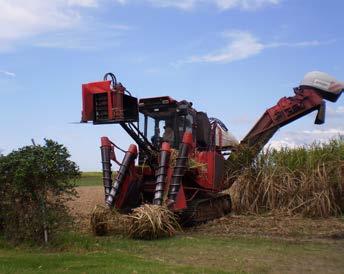
With over 30 years experience, Drain Tech can ensure you get every drill to the Mill. Sub-surface Drainage High Pressure Drain Jetting Irrigation Mains Contour Mapping and Design ~ Servicing growers from Mossman to Mullumbimby ~
Call Richard on 0428 528 054 www.draintech.net.au

ROCKY POINT
The Rocky Point Mill crushed a total of 40,621 tonnes of cane during Week 5 of crushing, with an average CCS of 12.71.
Our estimate is currently sitting at 322,224 tonnes, so we still have a long way to go. The weather has fined up. The soil profile has plenty of moisture, and some growers have now begun planting. The second phase of the Fire Ant SelfManagement Program has kicked off, with another batch of bait delivered for pilot participants.
MARYBOROUGH
Maryborough District has enjoyed some kind weather for the past month with a couple of wet weather stops and very few issues with the mill.
As at 28 August, we had crushed 194,648 tonnes, with CCS still performing well at 13.87. The highest CCS for the week was 16.7 for Q252 1st ratoon at Tinana. It has been a busy period during August with board meetings, industry meetings, herbicide meetings and grower meetings.
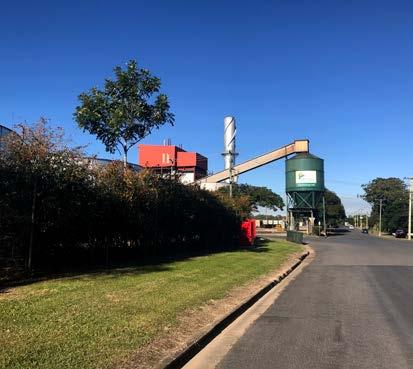
The district board is now progressing discussions with Isis Mill to ensure we are able to manoeuvre for 2021 and should MSF sugar outline their intentions for the future, we can adapt as needed. The concern around economic impact without the mill also has us now investigating government support for infrastructure that may be needed.
MINIMISE YOUR RISK TO EXTERNAL FINANCIAL FACTORS Why do growers irrigate their crops? That is a question, It’s a philosophy we live and breathe at Bennett Partners we’re sure, you already know the answer to. Chartered Accountants here in Mackay and we are excited What might not be front of mind is that the very same reasons you irrigate can – and should - apply to managing the accounting and financial wellbeing of your business. to announce the next stage of our own growth story as we ally with another like-minded Queensland regional firm to become Sammut Bulow Bennett Partners. While irrigation reduces the dependency on external variables such as rainfall while improving crop reliability it also provides increased flexibility across your farming So, while our name and branding will slightly change in the near future, our friendly local team and genuine professional service is here to stay. operations. The same applies to your accounting and We’re proud to work with our regional growers and look business advisory needs. By working with professionals, forward to partnering with you to achieve your personal, you are minimising your risk to external financial factors business and financial goals. while maximising flexibility; allowing you to focus on what you do best while knowing you are partnered with a team who knows your business and goals.
Your partners in Agribusiness
- Tax & Accounting - Insurance - Private wealth - Audit & Assurance - Succession Planning - Bookkeeping & Payroll
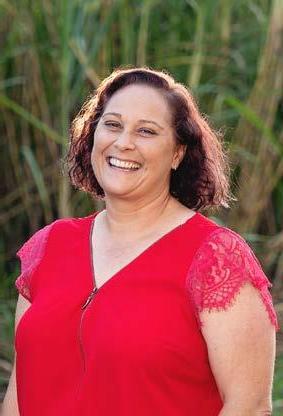
Therese Scotton Partner








